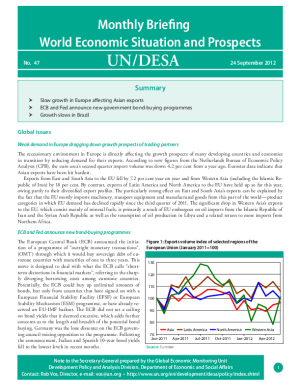September 2012
Summary:
- Slow growth in Europe affecting Asian exports
- ECB and Fed announce new government bond-buying programmes
- Growth slows in Brazil
The recessionary environment in Europe is directly affecting the growth prospects of many developing countries and economies?in transition by reducing demand for their exports. According to new figures from the Netherlands Bureau of Economic Policy?Analysis (CPB), the euro area?s second quarter import volume was down 4.2 per cent from a year ago. Eurostat data indicate that?Asian exports have been hit hardest.?
?
Exports from East and South Asia to the EU fell by 7.2 per cent year on year and from Western Asia (including the Islamic Republic of Iran) by 18 per cent. By contrast, exports of Latin America and North America to the EU have held up so far this year,?owing partly to their diversified export profiles. The particularly strong effect on East and South Asia?s exports can be explained by?the fact that the EU mostly imports machinery, transport equipment and manufactured goods from this part of the world - - product?categories in which EU demand has declined rapidly since the third quarter of 2011. The significant drop in Western Asia?s exports?to the EU, which consist mainly of mineral fuels, is primarily a result of EU embargoes on oil imports from the Islamic Republic of?Iran and the Syrian Arab Republic as well as the resumption of oil production in Libya and a related return to more imports from?Northern Africa.?
?
Download the World Economic Situation and Prospects Monthly Briefing No. 47
 Welcome to the United Nations
Welcome to the United Nations
